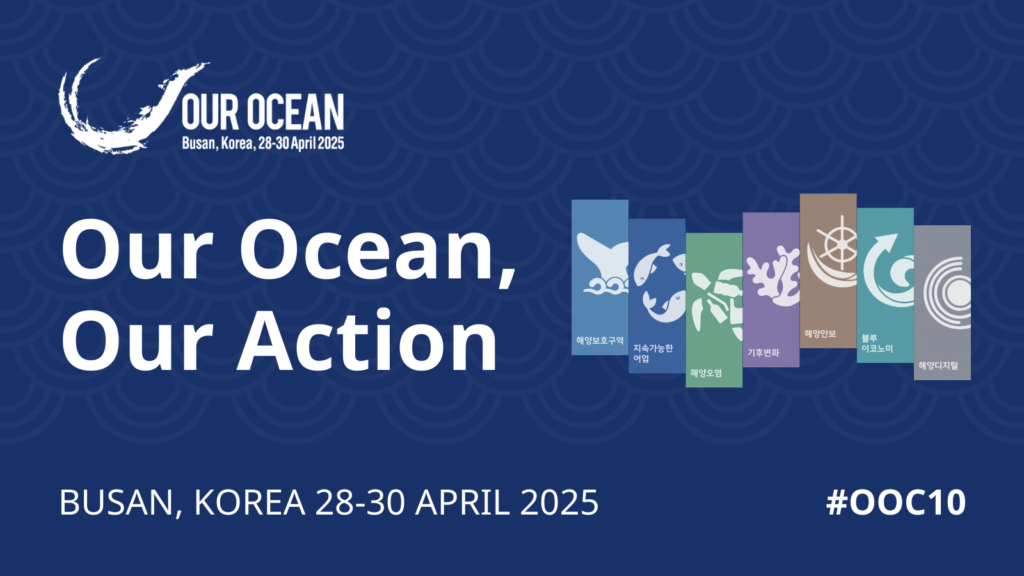For the Ocean We Share ‘Our Ocean Conference’
Jungdo Kim, Head of Climate & Ocean Research Division, Climate Ocean Research Institute (CORI)
The 10th Our Ocean Conference (OOC) will take place in Busan, South Korea, from April 28 to 30. While Korea has hosted various international environmental conferences in the past, this is the first time that a high-level international forum solely dedicated to the marine environment will be held in the country—making this event especially significant.
The OOC was first launched in 2014 under the leadership of then U.S. Secretary of State John Kerry during the Obama administration. It remains the only global forum focused on protecting marine ecosystems, aligned with Goal 14 of the United Nations Sustainable Development Goals (SDGs): “Life Below Water.” The OOC aims to foster international cooperation and drive concrete actions to safeguard the ocean.
Bringing together governments, NGOs, the private sector, and academia, the OOC serves as a dynamic platform for multilateral collaboration. Participants work together to find solutions to pressing ocean issues and make measurable, time-bound commitments. The 2025 conference in Busan is expected to gather high-level representatives from over 100 countries, more than 400 NGOs, and around 1,000 global leaders.

This year’s theme is “Our Ocean, Our Action.” The conference will set the direction for cooperation on sustainable ocean use, focusing on seven key areas:
- Marine Protected Areas (MPAs): Actions for 30 by 30
2. Sustainable Fisheries: Actions to Eliminate IUU Fishing
3. Marine Pollution: Actions to Tackle Marine Plastic Pollution
4. Climate Change: Actions for Carbon Reduction in Our Ocean
5. Maritime Security: Actions for Stable International Maritime Order
6. Blue Economy: Actions toward Creating an Innovative Framework for the Blue Economy
7. Digital Oceans: Actions for Advancing Sustainable Ocean through Digital Technology
Particular attention at this year’s conference will be given to two critical global processes: the international agreement on the conservation and sustainable use of marine biodiversity in areas beyond national jurisdiction (BBNJ Agreement), and the ongoing negotiations toward a legally binding Global Plastics Treaty (INC process).
What sets the OOC apart is not just the dialogue, but the tangible outcomes it generates. Historically, host countries have strengthened their marine policies ahead of the conference and demonstrated leadership through meaningful action.
Notably, for example, following the first OOC, the United States expanded the Papahānaumokuākea Marine National Monument in the Northwestern Hawaiian Islands by fourfold to 1,510,000 km², banning commercial fishing and seabed mining in one of the world’s largest marine protected areas—home to over 7,000 marine species and ancient coral reefs.
Successive hosts have followed suit. Chile, the second host country, designated 720,000 km² around Easter Island as a marine protected area. Malta, the fourth host, established MPAs across 30% of its national waters. Panama, which hosted the 8th OOC, expanded the Banco Volcán MPA, resulting in 54.3% of its marine territory being protected from commercial fishing.
Most recently, Greece, the ninth host, established new marine national parks in the Ionian and Aegean Seas, totaling 14,000 km² and 8,000 km² respectively. It also pledged to ban bottom trawling in all marine national parks by 2026, and across all MPAs by 2030.
Through such efforts, OOC host countries have played a pivotal role in advancing global marine protection. Now, as the 10th host nation, South Korea is stepping forward.
On March 14, 2025, the National Assembly of South Korea ratified the BBNJ Agreement, and the government deposited the instrument to the United Nations on March 19. This made South Korea the first country in East Asia—and the 21st globally—to ratify the treaty, ahead of China, Japan, and Russia. The move is perceived to have had a catalytic effect, encouraging further ratification efforts across Asia.
Additionally, the recent designation of a 1,000 km² marine protected area around Gwantaldo Island near Jeju Island marks a significant step in Korea’s marine conservation journey. The government has already pledged to designate 30% of national waters as MPAs in line with international commitments. This new MPA signals its proactive willingness to expand Korea’s marine conservation efforts.
The OOC is not merely a platform for declarations; it provides real momentum for meaningful marine action. Through the Busan conference, Korea is demonstrating its commitment to global cooperation and its resolve to fulfill shared promises made within the international community.
We hope that this conference will serve as a turning point for Korea to emerge as a global leader in ocean protection. May the 10th Our Ocean Conference become a vibrant forum for action and inclusion—one that accelerates the conservation and sustainable use of our ocean, ensures the coexistence of people and marine ecosystems, and promotes our collective prosperity. It is our hope that this will be a milestone gathering where we can witness real action for the ocean we all share.
This article was originally published in Korean by Jeju Sori on April 21, 2025. https://www.jejusori.net/news/articleView.html?idxno=435717
